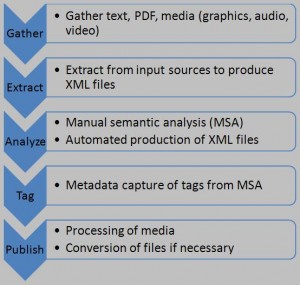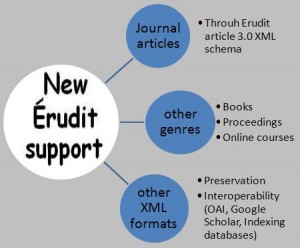Presenter: Martin Boucher
July 9, 2009 at 9:30 a.m. SFU Harbour Centre. Rm 7000

Background
Mr. Martin Boucher is the Assistant Director for the Centre d’édition numérique/ Digital Publishing Centre located at the University of Montreal, located in Montreal, Quebec. This centre along with the library at the University of Laval are the sites of the Erudit publishing locations which serve as a bridge to the Open Journal Systems (OJS). Erudit focuses on the promotion and dissemination of research similar to the Open Access Press (part of the PKP 2009 conference).
Session Overview
Mr. Martin Boucher highlighted the features and implications of a new publishing platform called Erudit (Session Abstract). He focused on sharing the capabilities of the Erudit publishing platform by first providing a brief historical overview of the organization, describing the publishing process, then introducing Erudit, and concluding with the benefits of such a platform.
(1) Historical Overview
Mr. Boucher started the session by pointing out that Erudit is a non-profit, multi-institutional publishing platform founded in 1998. This platform, based in Quebec, provides an independent research publication service which consists of access to various types of documents in the humanities and social sciences fields to the universities. Erudit also encouraged the development of Synergies which is a similar platform but targets a more mainstream audience since it is published in English. Some facts about Erudit:
- International standards are followed
- Publishes over 50000 current and back-dated articles
- Offers management services, publishing, and subscriptions
- 90% of the downloads are free
- Have over 1 million visits per month
(2) Publishing Process
The description of the publishing process constituted at least a third of the presentation time. Mr. Boucher felt it necessary to take the time to describe to the audience the details involved so it would be easier to compare the similarities and differences between the new and old versions of the system. To begin, Mr. Boucher indicated the publishing process accepted only journals based on extensible markup language (XML), and various input sources (In Design, QuarkXPress, Open Office, Word, RTF). Also, he pointed out that there are no peer-reviews, in fact: only the final documents are considered to be a part of the collection. It should be pointed out that these documents meet high quality standards as they are expected to be peer-reviewed before submitting to the publishing platform. As of yet, Erudit does not have the software to assist in a peer-review type of process. The belief of the Erudit community is to provide quick digital dissemination of the articles. This complicated, lengthy process is made possible by a team of three to four qualified technicians, one coordinator, and one analyst, all of whom ensure a smooth transition of the documents into the virtual domain. The publishing process consists of five key steps as outlined in Figure 1. Mr. Boucher elaborated on the importance of the analysis step. He went on to outline the three steps of the manual semantic analysis. The first consists of manual and automated tagging where detailed XML tagging is only for XHTML, and less tagging is done on PDF files. The second step consists of the automated production of XML files for dissemination. And lastly, a rigorous quality assurance by the technicians prior to dissemination sums up the analysis step of the publishing process.

(3) New Erudit Platform
Once the publishing process was described, an illustration of the new Erudit platform was revealed. Mr. Boucher indicated there is now increased support for journal articles through the Erudit Article 3.0 XML schema (see Figure 2). Further, there is support for additional scholarly genres such as books, proceedings, and even online courses (a recent request). It should be mentioned here that some of these other forms of documents are still in the experimental stages such as digitizing books. In addition, there is continued support for other XML input/output formats to ensure preservation and interoperability such as with the Open Archives Initiative (OAI), Google Scholar, and indexing databases.

(4) Benefits
To conclude his presentation on Erudit, Mr. Boucher explained the advantages of incorporating such a system by mentioning particular benefits of interest:
- Purely Java-based
- User-friendly because they have a universal set of tools inside the applications which makes it easier for the support technicians to troubleshoot and work with
- Supports plug-ins and extensions
- All scholarly genres are supported
- The process is simpler to follow
- An increase in the quality of data is noted
- The decrease in production time is evident
- There is less software involved
Mr. Martin Boucher hinted that the beta version of Erudit was to release in Fall 2009.
Questions from the audience asked at Mr. Boucher’s session:
- Question: For the open access subscription of readership which consists of a vast collection, are statistics being collected? Answer: Not sure.
- Question: Will the beta version of the publishing platform be released to everyone for bug reporting, testing, or move internally? Answer: Not sure if there will be public access. But it is a good idea to try the beta platform.
- Question: Are you considering using the manuscript coverage for the Synergies launch? Answer: The new platform is creatively tight to what we are doing, and it is really close, with Synergies in mind.
- Question: In a production crisis, are journal editors with you until the end of the process? Answer: They are there at the beginning of the process. They give material, but we do our own quality assurance process and then we release to the journal, however it is our own control. Also, the editors cannot see the work in the process such as the metadata, thought we do exchange information by emails.
- Question: Has the provincial government been generous in funding? Answer: The journals had to publish in other platforms. There is a special grant for that. It is easier for us with that granting repository for pre-prints, documents or data section of the platforms which serve as an agent for them. Yet, Erudit is not considered by the government, although we are trying to get grants from the government. Currently to maintain the platform we only have money for basic management. In order to continue developing platforms (such as Synergy), to get support from the government is difficult.
- Question: How do the sales work for the two platforms? Answer: If you buy it, you will have all the content and access increases.
- Question: How is it passed to the publisher? Answer: The money goes to the journals, keep only a small amount for internal management since we are a non-profit society.
- Question: Could you describe the current workflow and time required to publish one article? Answer: It depends on the article. If we are publishing an article that has no fine grain XML tagging or it is text from a PDF, then it requires less time for us to get it out. It depends on the quality of the article and the associated graphics, tables, size etc. We publish an issue at a time. It takes say two days to get an article published.
Related Links
University of Montreal receives $14M for innovation (news article)
Contact the University of Montreal or the University of Laval libraries for more information on Erudit.
References
Boucher, M. (2009). The new erudit publishing platform. PKP Scholarly Publishing Conference 2009. Retrieved 2009-07-09, from http://pkp.sfu.ca/ocs/pkp/index.php/pkp2009/pkp2009/paper/view/182
2 replies on “The new Érudit publishing platform: The Session Blog”
A few words about the peer-reviewing in Érudit.
At Érudit, we publish only journals that meet high-quality criterias. In that sense, all the journals must be peer-reviewed although Érudit does not offer any software to assist them into that process.
Thank you for the clarification regarding the peer-review process.